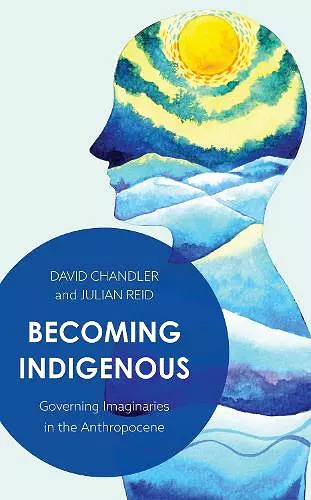Becoming Indigenous
Governing Imaginaries in the Anthropocene
David Chandler author Julian Reid author
Format:Paperback
Publisher:Bloomsbury Publishing PLC
Published:3rd Oct '19
Currently unavailable, and unfortunately no date known when it will be back

Representations of indigenous peoples, while never static, have always served the interests of settler-colonialism. Historically, the dominant framing marginalised indigenous practices as legacies of the distant past. Today indigenous approaches are demanded in order for settler-colonialism itself to have a future. Becoming indigenous, we are told, is a necessity if humanity is to survive and cope with the catastrophic changes wrought by modernist excess in the Anthropocene.
Becoming Indigenous provides an agenda-setting critique, analysing how and why indigeneity has been reduced to instrumental imaginaries of perseverance and resilience. Indigenous ‘alternatives’ are today central to a range of governing discourses, which promise empowerment but are highly disciplinary. Critical theorists often endorse these framings, happy to instrumentalise indigenous peoples as caretakers of the environment or as teaching the moderns about their ‘more-than-human’ responsibilities.
Chandler and Reid argue that these discourses have little to do with indigenous struggles or with challenging settler-colonial power. In fact, instrumentalising indigeneity in these ways merely reinforces neoliberal hegemony, marginalising critical alternatives for both indigenous and non-indigenous peoples alike.
Written by two of the most important political theorists writing on the Anthropocene, Becoming Indigenous is an agenda-setting critique. It deftly indicts and exposes the shocking ways in which indigenous peoples are being framed and saturated with meaning by others; reduced to tropes of mere adaptation and resilience or to sites of speculation: reducing meaningful resistance and politics. -- Jonathan Pugh, Senior Academic Fellow in Territorial Governance, University of Newcastle
Faced with the end times of climate catastrophe, we are all compelled to ‘become indigenous’. Chandler and Reid track the adoption of indigenous knowledge across Western scholarship, government policy and activism—not to address historic dispossession and exclusion, but as resources for newly imagined Western futures.
This important and provocative book exposes fault lines in the most influential critical theory of our times. Tracking relationships between the colonization of indigenous imagination and the policing of indigenous imaginaries, Becoming Indigenous clears new ground for differently figured politics of coexistence.
This important book questions Anthropocene theory’s growing celebration of a life defined by entanglement, limits, vulnerability, and dispossession. Instead Chandler and Reid argue that both governments and critical theorists’ discursive deployments of such qualities, ascribed to the lives of all indigenous peoples, serve not to empower but rather discipline populations and morally shore up ideology. It is highly recommended. -- Stephanie Wakefield, Urban Studies Foundation Research Fellow, Florida International University
ISBN: 9781786605726
Dimensions: 217mm x 153mm x 15mm
Weight: 295g
194 pages